|
MUNICH’S BEST HOSTS
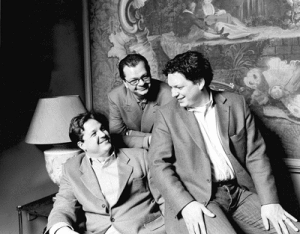 |
|
The Geisel brothers
|
text ©2010
Geisel Privathotels is a Munich-based private hotel and gastronomy group founded in 1900 by Anna and Karl Geisel, the great-grandparents of the present owners, Carl, Michael and Stephan Geisel. Today it includes the four hotels (Hotel Königshof, a member of “The Leading Small Hotels of the World,” Hotel Excelsior, trendy Anna Hotel opened in 2002 and named for great-grandma, and Cosmopolitan Hotel not far from Tantris), and three restaurants. The Geisel brothers were awarded the title “Hotelier of the Year” in 2008.
Again in June, thanks to the Munich Tourist Board, Christoph Schieber, the Sales & Marketing Manager of Geisel Privathotels, and the Geisel Family, Epicurean-Traveler.com’s Rome Bureau Chief, Lucy Gordan, enjoyed three splendid nights and two unforgettable meals at the Hotel Königshof, and one delicious dinner at the Vinothek. During her stay she met with Stephan Geisel and Martin Fauster, the Königshof’s young Executive Chef.
Fauster’s menu recommendations for supper were: asparagus with cured loin and beef tartare, marinated yellowtail mackerel with cous cous and curry, lukewarm char with radish and sorrel, crayfish with mango and almond vinaigrette, turbot with bouillabaisse stock and rouille, saddle and braised shoulder of venison with cabbage, peanut and salt shortcrust with caramel and raspberries. The meal was accompanied by sommelier Stephane Thuriot’s suggestions: Schloss Proschwitz-Sachsen 2009 Scheurebe Kabinett Trocken; the Geisel family’s 2008 Markelsheimer Probstberg Riesling Spätlese Trocken; Domaine F. Chidaine 2007 Montlouis Sur Loire; Domaine Rossignol-Trapet 2007 Savigny-Lès-Beaune; and Domaine Perrin & Fils 2007 Muscat de Beaune de Venise.
Fauster’s lunch recommendations were: shrimp with medlars and pistachios, Dover sole sautéed with sesame, beetroot and stock of onions; oxtail terrine with goose liver and parsley oil; breast and leg of pigeon with ciabatta, and crunchy almond mousse with biscuit, rhubarb, and eggnog. Lunch was accompanied by sommelier Stephane Thuriot’s suggestions: Delamotte, Mesnil sur Oger, Brut champagne; Savignola Paolina 2005 Chianti Classico Riserva; Geisel 2007 Markelsheimer Probstberg Riesling Auslese; and Reneklode, a distilled beverage from Würzburg.
STEPHAN GEISEL
You are the third and the youngest brother of the fourth generation of your family to own hotels in this neighborhood of central downtown Munich. You lived as a small child in the Hotel Excelsior so what is your first memory of the Geisel hotels?
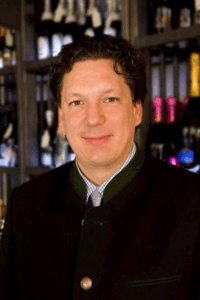 Stephan Geisel
SG: That everything was very big, HUGE. I used to spend my free time with the chambermaids in the Excelsior because I found it fascinating to go into the different rooms and explore them and to help clean them up. Sometimes if I found one of the chambermaids especially pretty, I would say: “I’m going to marry you.” At the time I was around five years old or thereabout. My first memories are of course of The Excelsior because we lived there. We had a small apartment on the fourth floor. I grew up with the staff there. They were part of our family. The Excelsior was our playground. When we were a bit older, around twelve years-old, especially my brother Michael, we liked to work as bellboys because many of our international guests gave us generous tips.
So it was your great-grandparents Anna and Karl Geisel who opened three restaurants: The “Pasinger Weinbauer” and the “Zum Brüderl” in 1923/4 and then the “Bürgerbräu,” a restaurant with a wine cellar, butcher shop and ice machine, in 1933 before opening the “Rheinhof,” their first hotel at Munich main railroad station in 1935.
SG: Yes, in their restaurants they introduced wine to this city, the beer capital of the world, but most importantly my great-grandmother was a very skilled chef. Her cooking was the drawing card. At that point in time wine played a secondary role. When they opened Rheinhof and bought the Excelsior (1936) and the Königshof (1938), then wine became important.
So in your family there was always a preference for wine over beer?
SG: No, not always because our family connection to the hospitality business began in 1900 with our management of the Lowenbräu tent at that year’s Oktoberfest. Our connection to wine which has since had priority to beer really began with my grandparents because the father of my grandmother Maria was a doctor. He loved wine and he bought a small vineyard about 30 kilometers from Würzburg. His name was Dr. Schindler. When he died, my grandfather, also named Karl like his father, took over the vineyard and served the wine in his restaurants. Here at the Königshof we already imported wines from Bordeaux, made exclusively for the Königshof with our own label. It was really my father named Carl with a C, who began expanding our exceptional wine list after the renovations of the Königshof in the early 1970s. He changed the style of its restaurant to classical French and he started to serve the best German and French wines worthy of the cuisine. Later he added Italian and Austrian wines. All this was quite revolutionary because in the 1970s here in Munich there was not yet a demand for the high-quality wines — it was still quantity over quality. At that time it wasn’t easy to learn about wine. Now there is the internet and you can get all the information you need, but forty years ago that wasn’t so. We all three inherited this love of wine from my father. Now I’m in charge of our cellar.
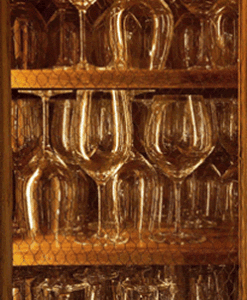
What are your first memories of wine?
SG: Not exactly memories of wine but in memory of my father. We all three admired our father. I was only thirteen when he died. We wanted to please him and carry one what he started. Let’s say the times were different. My father bought really good bottles, but he never had expensive bottles in his private cellar. Sometimes I feel a bit ashamed when we drink a very expensive bottle. My father drank good wines, but not really expensive ones.
Your father died in 1984, so it was really your brother Carl who opened “Vinothek” in 1991?
SG: My mother in collaboration with my brother Carl. The idea was to open a brasserie, a bistro, also French-style. I had the opportunity to go with my mother to Paris; we visited all the great brasseries, bistros to get some inspiration, but then in the end we said “No that’s not what we want, we must open a restaurant dedicated to wine because we have such a huge and special wine cellar already.” My mother was a very strong leader, but she has a very big heart. So that’s how Vinothek was born. I was only 18 and still in school, but I designed the Vinothek and chose the new labels to increase our stock. I was already very interested in wine.
The Vinothek has a three-page menu of delicious food and a thirty-page wine list of wines from everywhere. Here in the hotel you have a wine list of over 1,000 different labels. Do you have some of the same wines there as here?
SG: We cannot have such an extensive wine list at the Vinothek as we have here at the Königshof, because you need so much space for so many different wines. Not to mention that you need to cool the white wines. Let’s say that the Vinothek has a selection out of the Königshof’s cellar. If a guest at the Vinothek wants to drink a very special bottle that we have here at the Königshof, we can bring it to him. That’s not a problem. However, we won’t sell him a bottle to take home. We only sell bottles at my wine store named “all about wine” here on the ground floor of the Königshof.
It seems that your expertise in wine is in your DNA and hands-on through experience or did you take a sommelier course?
SG: In 1993 I spent half a year at a winery called Domaine De Chevalier in Graves. They produce excellent white Bordeaux. I did a bit of everything there. I worked in the vineyards; I did the harvest. For me it was important to see what hard work is involved in producing wine. When you just open a bottle and drink it, you don’t know how much passion is involved to make a truly great wine.
Could you say that you had one or two people who were your mentors for learning about wine?
SG: Mr. Olivier Bernard, the owner of Domaine de Chevalier. I learned wine production and the philosophy behind it from him. When you drink a wine, you have read a lot about it, but first of all you have to develop your own taste. You can learn a lot about wine theoretically, but you have to develop your own opinions and taste. Sometimes people will tell me: “My opinion is the opinion of Robert Parker.” He is, as I’m sure you know, a very good wine journalist, but I have to disagree sometimes and say, “No, this is my taste, my style.”
So you prefer Bordeaux to Burgundy?
SG: No, I like every wine if it’s good. I don’t care if it’s Burgundy or Bordeaux. It doesn’t have to be French. For example, I like well-produced Chianti. A good wine must have an identity and not be industrial or an international blend with Cabernet, Merlot grapes. I like wines which go with, remind me of, a certain place, certain foods, certain occasions and certain people. A connoisseur must know all about the wine’s terroir, the production, how to combine it with which foods, your memories. Then you get a third dimension.
After you returned from Bordeaux did you do a sommelier course?
SG: No, I worked in the Vinothek for nearly two years. There I got a lot of experience and learned the tastes of my guests. Afterwards I went for two years to the Hotel Management School in Heidelberg. Mostly business and accounting. Very dry stuff!
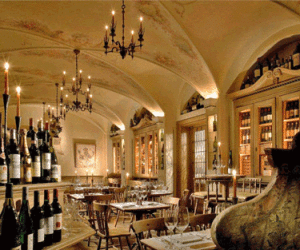 |
|
Geisel’s Vinothek in the Excelsior
|
You opened your wine store here in 2000, how many labels did you have?
SG: About 300. Let’s say it’s a selection of the wines you can get in our restaurants because, as I told you, I buy all the wines for our restaurants. Of course, as with Vinothek, I can’t have all the wines I buy on display and for sale here. The rarities are for the guests of the Königshof’s restaurant.
Do you change the wines here in the shop according to the season, as you do in the restaurants?
SG: Yes, of course.
You and your brothers still own your grandmother’s vineyards?
SG: Yes, Paul Fürst, one of the best winemakers in Germany, produces our wines. My family harvests the grapes ourselves and takes them to Mr. Fürst near Würzburg to make our wine. This wine, Markesheimer Probstberg is a Riesling, Spätlese “trocken” and is only sold in our restaurants and in my shop of course. He produces only 5,000 bottles every year.
So the vineyards and the hotels belong to all three of you?
SG: Yes, we share everything together in equal shares.
You are in charge of the wines for all your hotels; you run this shop; you must travel worldwide to select your wines. How do you divide your time? Your typical day?
SG: It is very difficult. I would like to have more time to go abroad and visit new wineries, but I have to stay here. I spend three or four hours in the shop, then I visit the chefs and sommeliers in our hotels, sometimes greet our guests…It’s a long day. I love my work so my day is over when it’s over.
I also go to hotels that are not owned by us, but to which I sell wine — the Rocco Forte hotels in Munich, for example. Sometimes I have to go to Frankfurt or Hamburg to sell my wines or give advice to top hotels and restaurants. I do that here in Munich too. For example, I invent wine lists for these clients. I know what their clients will want to drink. It’s easiest for me in Bavaria, because I’m from here. I know the Bavarians’ preferred wines. Palates are different in Hamburg, where they eat a lot of fish, from those in Munich, which are influenced by their proximity to Austria and Italy. I try to combine well-known wines that all top restaurants need to have in their cellars with a few very special labels. You need to have wines that will make money for you and then some for love.
So really I don’t have a typical day. No two days are alike.
The most thrilling eno-gastronomic experience you ever had?
SG: Eating at Witzigmann’s Aubergine when I was about sixteen. I never ate like that before or afterwards. It was a stratospheric meal.
What are your favorite wines?
SG: 2008 Markelsheimer Probstberg, our family wine; 2007 Chardonnay Miani from Friuli in northeastern Italy; 2005 Brunello di Montalcino from La Pieve winery, which produces only 3,000 bottles a year and exclusively for us; 2003 La Táche Grand Cru Domaine de la Romanée-conti, for me the best Burgundy in the world; and champagne La Grande Année Rosé Bollinger 1999.
If you had not become an hotelier and wine merchant, what other profession would you have chosen?
SG: My first profession was chef. I worked in France in a restaurant with two Michelin stars: La Terrasse in Juan Les Pins, Antibes. I would have continued but there were too many other aspects of the hotel business to learn. I still love to cook. We offer cooking lessons in the Excelsior in German, English, and Italian; we hold wine tastings in my shop every three months, and we host wine dinners with wine producers. It’s very important for a chef to have a good knowledge of wines and for a sommelier to know a lot about food. A good chef is a mentor for his students, and then his students become mentors for others.
You said that you wanted to be a chef and that you still love to cook. What are some of your specialties?
SG: Spaghetti with tomato sauce, grilled entrecote with béarnaise sauce, gratin dauphinois, and soufflés for dessert.
What are your favorite dishes at the Vinothek?
SG: Prosciutto di San Daniele and turbot with artichokes, fennel and olive polenta.
At the Königshof?
SG: Guinea fowl with lettuce, chanterelles, and fregola sarda.
What dishes on their menus are your recipes?
SG: None. It’s always a group decision. My brothers and I, with our chefs, always taste everything and then choose the seasonal dishes for our menus.
MARTIN FAUSTER
Our tastes in food are closely connected to our childhood; what are your first memories of food?
MF: I was born in St. Michael in Obersteiermark, near the small Austrian city of Leoben in Styria. My grandparents had a small farm. We always had fresh vegetables and we picked fresh mushrooms in the forest nearby. Of course they had pigs and every year we made sausages and all other pork products. On the way to school I picked fresh raspberries. When my father was young, he was a butcher. Later he worked in a factory, but farming was in his DNA, so when he could, he helped my grandparents and other neighboring farmers.
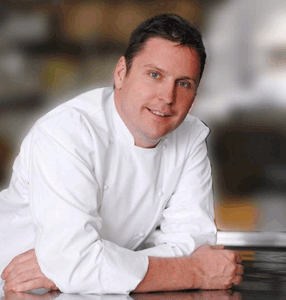 Chef Martin Fauster
Are there other chefs in your family?
MF: No, but both my grandmother and my mother were very good cooks. Everything we ate came from our garden and farm. They made everything at home. I think it was very important for my formation to have eaten foods when they were in season and at the apex of their taste.
My mother claims I cooked one of my sisters an egg dish with sausages when I was only six years old. I have three sisters and no brothers. My sisters all studied and are all professionals now.
Why and how did you decide to become a chef?
MF: Unlike my sisters, I did not like school and studying. I wanted a profession where I could work with my hands and be creative. My first job, really my apprenticeship from 1990-93, when I learned some of the basics, was in a very small restaurant called “Gösser Bräu” in Leoben.
My first real job was in the kitchen of the Hotel Intercontinental in Vienna. It was thanks to my brother-in-law who is not a chef, but told me to work in a big kitchen. He was right because there I learned the magnitude, the huge number and variety of products suitable for use in the kitchen. This allowed me to experiment, to prepare dishes with products I’d never seen before. At the Gösser Bräu I’d never seen fresh seafood or fresh venison, the huge variety of spices and herbs available. The Intercontinental was an incredible learning experience. It was there that I discovered my passion for cooking. At first I made breakfast, then lunch, and only later dinner. From here I moved on for a year to the Grand Hotel Quellenhof, a Leading Hotel of the World, in Bad Ragaz, in Switzerland, as a demi-chef saucier. A short time later I made the jump into the world of ‘star kitchens’ working a year as the “poissonier” or fish chef at Alfons Schuhbeck’s “Kurhausstürberl” (1 Michelin star) in Waging am See in Bavaria, and then as “Rôtisseur” at “Steirereck” in Vienna.
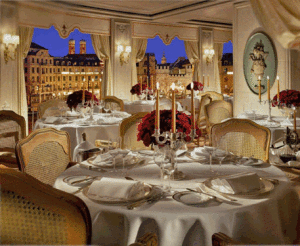 |
|
Gourmet restaurant in Hotel Königshof
|
You worked at Tantris with Hans Haas. Is he your mentor? What did you learn from him? Other influences? For example in Vienna? From Schuhbeck? From Olivier Roellinger?
MF: My first mentor was Mr. Herbert Hüpfel at the Intercontinetal. He was close to retirement age, but he had traveled all around the world. He taught me the basics of cooking. He was the first really professional chef I worked under. I was only 19-years-old and very shy.
At the Quellenhof in Bad Ragaz the Executive Chef was Hans Hediger. Although he too was in his sixties, every morning he was the first in the kitchen at around 5:30. He made breakfast. The Quellenhof was a traditional hotel with guests who returned every year. Mr. Hediger would greet them every morning. From him I learned the meaning of hospitality and which sauce went with which dish, particularly meat, and from Mr. Schuhbeck organization and self-discipline because at the Kurhausstüberl, besides the fine dining restaurant and beer garden, we did a lot of catering. Mr. Schuhbeck expected us to follow his example because he was often not there, but in Munich. I was in charge of making the soups and vegetables.
The chef at the Steirereck, the best restaurant in Austria (2 Michelin stars and 19 points Gault Millau), was Mr. Helmut Österreich. By that time I’d learned that every chef had his own way of preparing the same dish and that each chef’s different version was good. In other words, that there was more than one style to do the same thing. By the time I went to work for the first time at Tantris, my basics were very good and Mr. Haas was able to teach me some tricks of the trade and fine points.
After an intense course in different stations of different top kitchens in Germany and Austria, I took off for France, for the “Maisons de Bricourt” (2 Michelin stars) in Cancale, near San Malo, in Brittany under the magical guidance of Olivier Roellinger, the owner of three hotels, a spice store and another of local products from Brittany. I learned management and business from him.
When I returned to Munich a year later Mr. Haas asked me to be his sous-chef until he recommended me for this job here at the Königshof. I owe Mr. Haas a lot. He taught me to be a top chef and a good administrator.
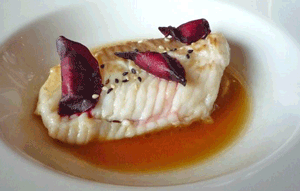
What are the essential qualities for becoming a top chef?
MF: Having a good team in the kitchen and also in the dining room. Self-discipline. Good taste. Passion, you must enjoy your job. It must be fun in spite of its very long hours.
Christoph Schieber, Sales and Marketing Manager, told me that you will be hosting a party for charity and have invited several other chefs to participate. Who are the others? Is this the first time you’ve organized such an event? Can you tell me something about the plans and how many people are coming?
MF: It’s the fourth time. We are expecting between 250 and 300 guests who can wander from table to table watching the chefs and tasting. It’s a benefit for the Phillipp Lahm Foundation, started by the soccer star for sports and education for underprivileged children. Last year the Phillipp Lahm Foundation was also the beneficiary. The years before we worked with UNICEF. The chefs who are joining me this year are: Witzigmann, Haas, Otto Koch, Ali Güngörmüs, Thomas Kellermann, Nobert Niederkofler from Italy, Ralf Knebel (now at the Hotel Erbprinz but before my sous-chef), Christian Scharrer, Bobby Bräuer, Heiko Nieder, Wahabi Nouri, Matthias Buchholz, and Bernard Antony, the cheesemaker. I’m making the meat, a whole saddle of venison.
What do you like best about your work?
MF: The creativity. For me, but also for my team, it’s also most special seeing when the restaurant is full, when our guests are happy and they come back. Unlike most hotels, most of the guests at our restaurant, 90%, are not staying at the Königshof. They are from Munich and Bavaria. The Königshof has a long tradition as a world-class restaurant.
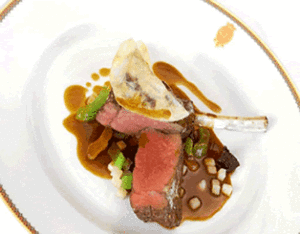 Chef Fauster’s fried loin of chamois The least?
MF: That I don’t have enough time for my family. I start everyday at 8 o’clock in the morning and stay until after midnight, and then twice a week I get up at five to go to the market.
What’s your culinary philosophy?
MF: To use the freshest and most seasonal produce. To have personal contact with my producers who have my same philosophy and goals.
In a nutshell how would you define your cuisine?
MF: Traditional dishes with a modern style. Simple, good, uncluttered. The ingredients must always be fresh and the focus, and cooked with fun and originality but no fuss.
What are your signature dish and other specialties?
MF: Fish, especially char, which is like a salmon trout, and pike. Local Bavarian fish because I know when it is very fresh. I have an aquarium downstairs. I’m also proud of my oxtail terrine with goose liver.
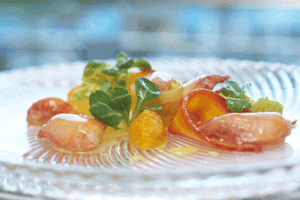 Lobster with mango cocoa and vanilla What do you believe is the reason for your success?
MF: Because I’ve worked very hard and always in different sections of top restaurants with good teams. Here Mr. Geisel, the whole Geisel family really, is an excellent boss. They and I have the same philosophy. That’s very important. They give me free rein to buy the best products. We also have a well-synchronized team in the kitchen and in the dining room.
I moved here from Tantris six years ago. I couldn’t make at Tantris the dishes I make here, because I worked under Mr. Haas at two different times for a total of six years, making his dishes, concocting his ideas. Here I have been able to develop my own style. Of course, I was influenced and learned a lot from Hans Haas — he is a very generous person — but now I have my own original style.
Up to now you have told me about Martin Fauster the chef; I’d like to know more about Martin Fauster the person. For example, your favorite foods?
MF: Wiener Schnitzel and I could eat fettuccine every day. Fresh crab with butter and salt. Boiled potatoes with butter. I also love homemade bread. When the produce is fresh and of the highest quality, all food is delicious. It doesn’t need to be expensive or have a complicated recipe.
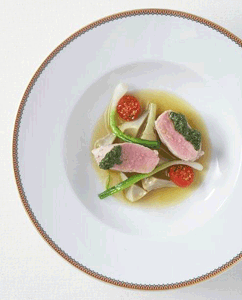 Chef Fauster’s Poached saddle-of-lamb Your favorite wines?
MF: I’m from Styria. I like the white wines from Styria. I also like German Rieslings. The wine I drink depends on the dish I’m eating or the occasion. I’m very lucky to work here because as you know Mr. Stephan Geisel is a wine expert. He has developed a huge wine list. Every two months we host a wine tasting.
Chefs are well-known for having collections, often of fast cars, motorcycles, or watches; what about you?
MF: Old books. I have a lot of old cookbooks, which I love, from the nineteenth century. Most of them are in German, but some are in French.
For many years you worked under very famous chefs, so the food critics and guides were judging your boss. But here at the Königshof, they are judging you, so what are your feelings about food critics and restaurant guides? Have they been helpful to you or do they add stress?
MF: They are important because when I came here we had no Michelin star and no Gault Millau points. When we didn’t have a Michelin star or high Gault Millau points, no young person wanted to work here as part of my team. Now we have two Michelin stars and 18 Gault Millau points, so young people want to work here because they think it’s a good place to learn, and that makes it easier for me to create a great team. Two of the former stars of my team are Ralf Knebel, who will participate in this year’s gala for the Phillipp Lahm Foundation, and Tohru Nakamura, who has a Japanese father and German mother, and now works at the Restaurant Oud Sluis in The Netherlands. For me it’s essential that the restaurant is full; that the guests are happy and come back, and that my staff, my team is happy too.
Other chefs besides Haas you admire?
MF: Olivier Roellinger because he’s so well-rounded and not a show-off. Too many famous chefs are full of themselves.
If they had not become chefs, Heinz Beck told me that he had wanted to be a painter; Marchesi a pianist; Thomas Keller the shortstop of the New York Yankees. What about you?
MF: A farmer. I miss having a vegetable garden.
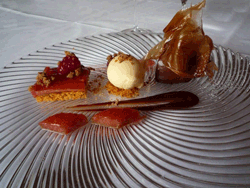
& & &
Lucy Gordan is an award-winnning travel writer and cultural journalist living in Rome, where she is Epicurean-Traveler.com’s Bureau Chief. For more of Lucy’s articles, click on her name below the title.
|











